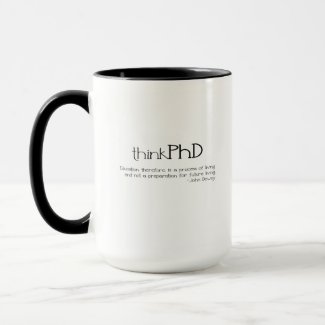YOU MIGHT BE A GRADUATE STUDENT IF…
Saturday, May 12th, 2012YOU MIGHT BE A GRADUATE STUDENT IF…
…everything reminds you of something in your discipline.
…you have ever discussed academic matters at a sporting event.
…you look forward to summers because you can study more productively without the distraction of classes.
…you regard ibuprofen as a vitamin.
…you consider all papers to be works in progress.
…you find the bibliographies of books more interesting than the actual text.
…you have give up trying to keep your books organized and are now just trying to keep them all in the same general area.
…you have accepted guilt as inherent feature of relaxation.
…you find yourself explaining to children that you’re “in 20th grade.”
…you start referring to things in Latin phrasing, as in “Snow White et al”
…you frequently wonder how long you can live on pasta without getting scurvy.
…you look forward to taking some time off to do laundry.
…you can analyze the significance of appliances you cannot operate.
…you are startled to meet people who neither need nor want to read.
…you have ever brought a scholarly article to a bar.
…you rate coffee shops by the availability of outlets for your laptop.
…you wonder whether APA style allows you to cite talking to yourself as “personal communication.”
…you are constantly looking for a thesis in novels.
…you have difficulty reading anything that doesn’t have footnotes.
…you consider caffeine to be a major food group.
…you’ve ever brought books with you on vacation and actually studied.
…Saturday nights spent studying no longer seem weird.
…the professor doesn’t show up to class and you discuss the readings anyway.
…you can read course books and cook at the same time.
…you hope it snows during Spring Break so you can get more studying in.
…you find taking notes in a park relaxing.
…you find yourself citing sources in conversation.
…you’ve ever sent a personal letter with footnotes.
…your glasses prescription is 3x stronger than it was a year ago and you have carple tunnel syndrome because 90% of your time is in front of the computer or reading.
…8% of your time is spent in class.
…2% of your time is divided among eating, sleeping, shopping, TV, laundry, and socializing.
…you use words that only the people in your classes can understand.
…some of those continuing education classes sound interesting.
…the last time you watched TV, Brenda was still on 90210 and McGuiver was making bombs out of duct tape.
…an exciting trip is when you run errands not related to school.
…you don’t remember the last fiction book you read.
…studying keeps you awake.
…a complete dinner might be a bagel with cream cheese and a diet coke.
…a full night of sleep is 4 hours and a 2 hour nap mid afternoon.
…the last time you worked out, women were wearing little rope headbands and legwarmers.
…if you actually do workout, you have mastered the art of studying while on the bike or stairmaster.
…the food groups are ramen, caffeine, Subway, bagels, and the occasional delivery.
…when you tell people your thesis topic, they blink repeatedly and purse their lips while attempting not to burst out laughing.
…you have an academic/professional text that you think is cool because you got the author to sign it.
…you consider cooking and cleaning your house/apartment leisurely breaks from real work.
…5:00 p.m. Friday means you are now scheduled to work on your paper for the next 48 hours.
…you have every minute of the next four months planned out but have no idea what you are going to do for the rest of your life.
…your friends and family become concerned because although you can now recite, word for word, the most popular theories in your field, you have lost all semblance of common sense.
…you can’t tell which of the last 30 drafts of a paper was the one to submit for a grade.
…you are considering naming your first born child with monikers that spell SPSS.
…sleep is considered an optional recreational activity.
…”The Committee” means some semi-secretive organization designed to keep you in Hades on Earth.
…you understand jokes about grad school. 😉
–copied
